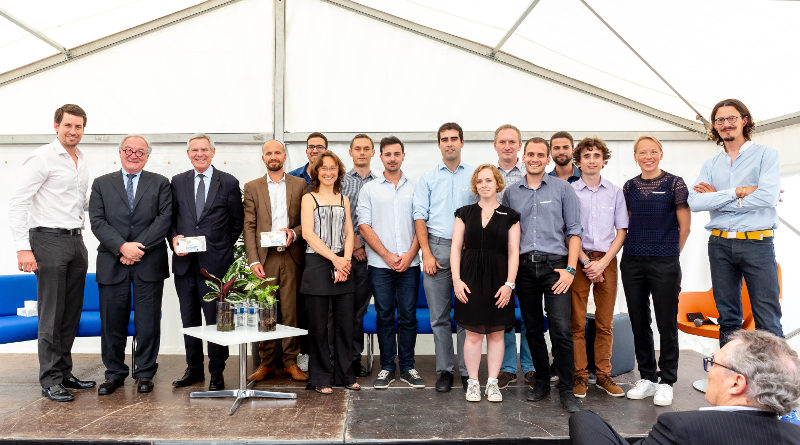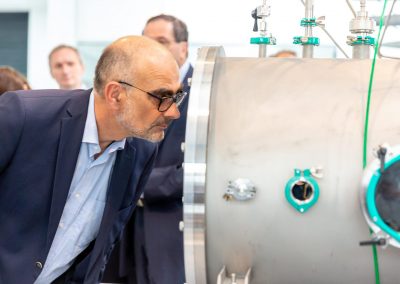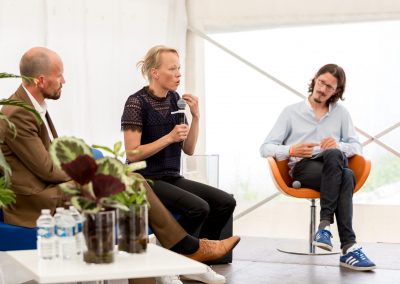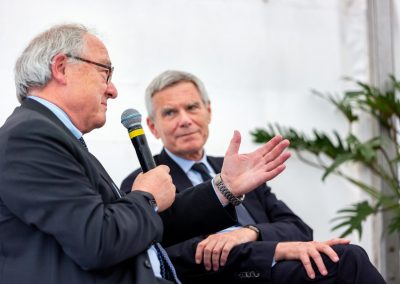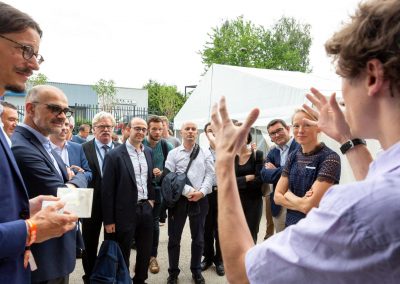ThrustMe is THE French startup of aerospace. A sector currently in full renewal. We took advantage of the inauguration of the new HQ of ThrustMe to meet the actors of the technological innovation of rupture in the space domain. Their message is clear: it is time to draw a line on deindustrialization.
*
How can we counteract deindustrialization?
Promoting technology start-ups is not enough. The word “technology” today refers to the digital world and related services. Too superficial; too orientated towards the short-term.
Hence the concept of DeepTech, which does justice to the long R & D cycles of breakthrough innovations. The kind of innovation that provides a sustainable competitive advantage.
The ambition of DeepTech is especially strong in projects such as ThrustMe – a start-up that is emblematic of the renewal of the space exploration market.
Our presence at the inauguration of the new ThrustMe headquarters, held on June 5, 2018, was very informative: it gave us an idea of what DeepTech looks like.
1. ThrustMe: a product, a market, a team.
Breakthrough innovation is a question of timing. To seize a new market, it is necessary to choose the right moment to propose a product that is technologically advanced and difficult to copy.
This is what ThrustMe is offering in the field of satellite propulsion. More precisely: in the miniaturization of propulsion in order to allow deployments of small satellites within constellations. In the coming years, the miniaturization of satellites will enable a much larger number of satellites to orbit the Earth. These small satellites will work in constellations, making it necessary to be able to modify their orbit.
The technology for these propulsion units of a new type comes from the team of Ane Aanesland, at the Plasma Physics Laboratory of École Polytechnique. She is the CEO and the face of the company.
The inauguration of the new ThrustMe HQ brought together team members, institutional and industrial partners, and investors.
In her speech, Ane Aanesland presented the story and the vision of ThrustMe. A story of technologists, built on international connections and key recruitments, through which the perception of a real market opportunity solidified itself: patent filing, recruitment of the future CTO Dmytro Rafalskyi, awareness of being ahead of the competition, recruitment of engineers and successive fundraising … and now the current phase of development of the industrial product, and the arrival of Gautier Brunet as COO.
Once the product is ready for the market, the long-term vision of the company could move towards the development of thrusters for heavier systems.
Once the product is ready for the market, the long-term vision of the company could move towards the development of thrusters for heavier systems.
Albert Meige, a member of the ThrustMe Advisory Board, then hosted a roundtable featuring:
- Jacques Biot, President of École Polytechnique,
- Jean-Jacques Dordain, member of the Global Space Ventures team and former Director of the European Space Agency
- Bertrand Baratte, Space Business Unit Director, Air Liquide.
Albert Meige first asked the participants what they thought was the secret of the speed of new aerospace players, such as SpaceX.
Albert Meige first asked the participants what they thought was the secret of the speed of new aerospace players, such as SpaceX.
According to Jean-Jacques Dordain, the secret lies, on the one hand, in the product orientation of a project, and on the other hand in the ability to make mistakes and learn quickly from them. Jacques Biot replied that “the essence of speed lies in boldness”: the boldness to gather a team of high-level talents around a risky project.
“the essence of speed lies in boldness” — Jacques Biot
The second question focused on the best industrialization strategy. Bertrand Baratte emphasized the importance of keeping the team together and taking the time to develop lean manufacturing skills that meet the high standards of the space sector. He added that another crucial aspect in the long term lies in the management of suppliers and the arbitration between different actors. Jacques Biot distinguished the four functions to which the product must correspond: the end user, the buyer, the regulator and the prescriber.
Albert Meige finally asked the participants of this roundtable to express their feelings about the problem of the financing of DeepTech start-ups, which is more difficult than it is for digital start-ups. Jean-Jacques Dordain reminded listeners that the key to raising funds is to have customers. Bertrand Baratte, for his part, affirmed the importance of keeping one or more steps ahead of the global competition.
2. The impetus of NewSpace
Several actors within the NewSpace ecosystem answered our questions about the evolution of the space industry.
Vincent Dedieu, Director of Operations and Deputy Chief Executive Officer, Sodern: “Another way of thinking, designing, developing, producing, and selling for Sodern.”
“Sodern is historically a space company, with a legacy spanning over thirty years. We see NewSpace idea as an opportunity for established players to develop new products, to question the way we develop products. Sodern, which is well known for its star trackers, has won the One Web contract to manufacture 1800 star trackers in two years. In the past we would usually build about fifty a year. NewSpace is another way of thinking, designing, developing, producing, and selling. NewSpace includes both established players and new players who set new standards, and a new business model that emerges through overall cost reduction and improved reliability. ”
Bertrand Baratte, Space Business Unit Director, Air Liquide: “Air Liquide is renewing its vision and its ambitions.”
“Access to space is becoming more democratic: NewSpace is a renewal of the players and their ambitions, such as Air Liquide, who wants to continue to grow in the space industry. Air Liquide, like all the players, renews its vision and its ambitions, through four axes: 1) An integrated global offer of cryogenic launchers for the international market; 2) The development of cooling systems for satellites; 3) The development of subsystem solutions for electric propulsion for satellite platforms; 4) Space exploration in the sense of production and storage of renewable energy. ”
Arthur Sauzay, lawyer, author of the report “Spatial: Europe strikes back” for the Montaigne Institute: “What is Europe’s ambition ?”
“NewSpace consists of the new markets and players in the space sector. Our recent report with the Montaigne Foundation tries to shed light on the issues of this emerging field, by identifying the strengths and weaknesses of Europe and trying to find solutions. If we summarize in a broad outline the vision that emerges from this report, we must first note that we are no longer in the same world that existed twenty and even ten years ago. Nations like the US and China have very strong ambitions in space. The first question that arises then for Europe is: what is our ambition? There are extraordinary things going on in Europe today; however, there is no overall ambition. The second question is resources and means. The trouble is that the US and China are putting more and more resources, both public and private, into space exploration. The third element is that we need new actors. I think ThrustMe, as a start-up that develops satellite propulsion, is exactly where new players are needed, because that’s where there is a need for new technologies. Europe’s ability to push these new players, help them up, offer them a market, is really what will in large part determine Europe’s ability to remain a technology leader. ”
3. The DeepTech ecosystem
We were also able to tap into the vision of the innovation ecosystem of several actors present at the event.
Matthieu Landon, Ministry of Economy and Finance, Directorate General of Enterprises: “Let hundreds of ThrustMes hatch!”
“Today, one of the government’s main priorities is to strengthen the French and European DeepTech ecosystem. We are mobilizing both the financial means and the regulatory means to do this. One advantage is that the ecosystem of French start-ups has experienced strong growth, with many very positive changes. There are about 10,000 start-ups in France. However, they remain too focused on digital, on technologies that do not require much capital. DeepTech’s companies need resources; more researchers are now turning to start-ups, for which there are already mechanisms in place, particularly under the so-called Allègre law. The PACTE bill should simplify regulations so that more researchers will consider working for and creating private companies. We also try to influence the financial means that are made available for DeepTech companies. In January, we set up a fund for innovation and industry, endowed with ten billion euros and devoted to breakthrough innovation and DeepTechs. Approximately 250 million euros will be invested each year, 70 million of which will, via BPI France, go directly to DeepTech labelled start-ups. The goal is to foster the hatching of hundreds of ThrustMes! ”
Xavier Apolinarski, President of SATT Paris-Saclay: “ThrustMe executed the maturation project in a very efficient way”
“Our role at SATT Paris Saclay is very simple: we detect start-up projects like ThrustMe at the early stages of their inception, about two years before the creation of the company. We invest when we believe in a team and a technology, which gives us confidence in the product, the market and the execution. The support we provide allows the maturation of these ideas: the transitions from scientific theories to a proof of laboratory to a proof of concept that can create solid industrial performances at the level of the market.
ThrustMe executed the maturation project in a very efficient way. They managed to reach all milestones of the maturation project in a timely manner. This is the first significant or differentiating point of the ThrustMe as a company: it executes its activities in a very clean and efficient way. This is the signature of a project that will develop well. The second point is that they are driven by a new, growing international market. ThrustMe’s international team is very agile in this context. They are in their element internationally, which is not the case for all French start-ups. Third point: in ThrustMe, there is a human dimension that is above average. There is a human cohesion characteristic of a company that is built for success. ”
Jacques Biot, President of École Polytechnique: “Today the market is not just the client.”
“All research is intended to be valued. The primary value or research is the satisfaction of the researcher, by advancing the field of knowledge. The contract we have with researchers at École Polytechnique ensures that they are given complete freedom to explore the frontiers of knowledge in their domain; they are the people who know best what are the boundaries of science. This freedom comes with the obligation to tell us what the applications of their research may be for the benefit of society, and that is where value creation comes in. Value creation in this sense starts from the moment we talk about the industrial applications of new technologies.
To validate an invention, it is not enough to have the idea, the science, and the technique; it is necessary to have a very precise idea of how it will work in the market. The market is not just a customer today. A customer is someone who has a function in the market, which can be broken down between several types: there is the customer who is the user, there is the customer who is the payer, there is the customer who regulates and there is the customer who prescribes. Very often in the technological professions, for example in the health professions where I come from, but also in the new technologies, we have an example of the function of the consumer split between all these functions. Value creation is only possible if the project is based on an intimate understanding of who will prescribe, who will use, who will pay and who will regulate. Our role at the School is to ensure that the researcher who has an idea confronts all these questions, so that he can make progress on a project to the point where, indeed, he will be able to find funders who will sufficiently believe in the project, and who will be sufficiently convinced by the business model to invest their good money and finance the development expenses of the project. ”
Jean-Jacques Dordain, member of the Global Space Ventures team and former Director of the European Space Agency: “All the ingredients for sucess are there.”
“We decided to invest in the ThrustMe project for a very simple reason – Ane told me that compared to the competition she had more performance, less mass, and that she was technologically ahead. This is why I was convinced at first, but that isn’t the end of the story by any means. The next step, which is essential, is to move to prototypes meeting the specifications. Then it will be a question of moving toward industrial production, to control the cost, the reliability – but I am quite confident all the ingredients for success are there.
David Szekely, investor at Colvmbvs: “Investors are often scared of hardware.”
“I am a business angel investor and I participated in the capital increase of ThrustMe (increase of 1.7M €). I usually invest in digital start-ups, which have a lot of cash available in the initial phases of their investment. For a company like ThrustMe in space hardware, it’s very difficult to do the first round of financing, because investors are often afraid of hardware, because it’s expensive, and because investment was needed when the product was still at the prototype stage, so the risk was high. In space development most European investors are not ready to finance the seed phase. My role is to fill this gap, alongside other investors, to allow the project to achieve this step and then raise funds from institutional investors. I feel lucky to have found this company. I wanted to invest in a NewSpace project. There aren’t that many, especially in France. I have been passionate about space since my youth. ”
Conclusion
ThrustMe embodies the renewal of industrial ambition that we would like to see in France and in Europe, with concrete objectives and high-level teams. Hopefully, this project will be the first of a long series of new French and European industrial successes.

